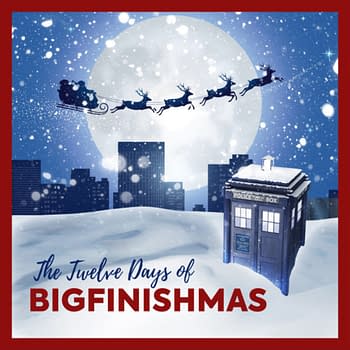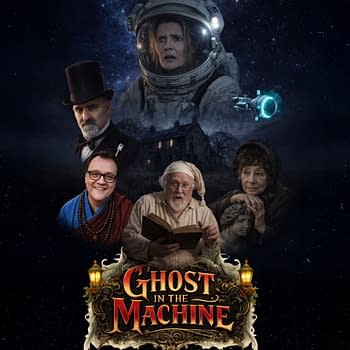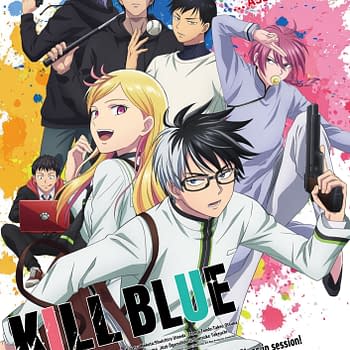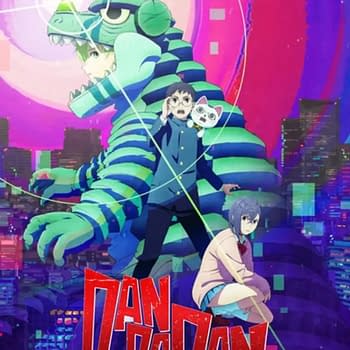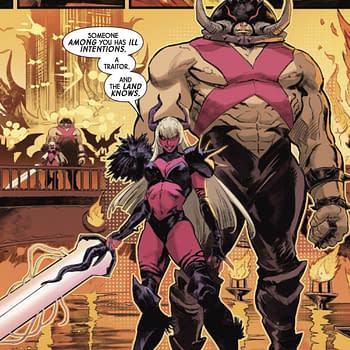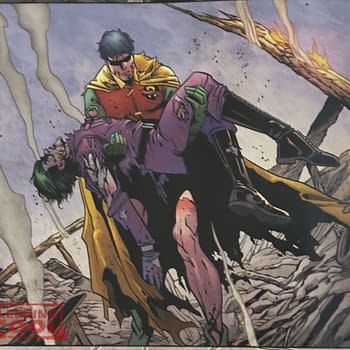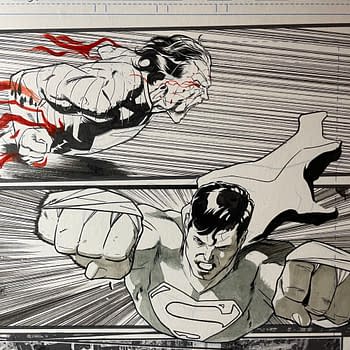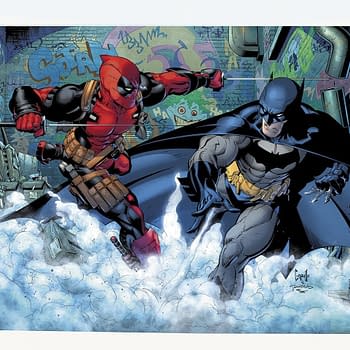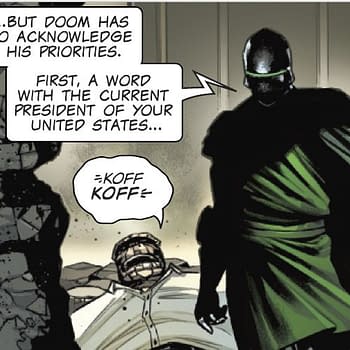Posted in: Comics, Recent Updates | Tagged:
Look! It Moves! – Ales Kot Returns with Generation Gone

Two years ago, Ales Kot was all over the comics scene and social media, the latest rising star writer getting a lot of attention with his earnest explorations of politics, discourse and genre fiction. His comics came thick and fast: Wild Children, Change, the hilarious and quirky run on Marvel's Secret Avengers, the deconstruction of the violence and despair inherent in secret agent thrillers Zero, the cosmic, psychedelic Bande Desinée-inflected take on Winter Soldier, the apocalyptic Los Angeles supernatural noir series Wolf, the politically present Material… then circumstances forced him to take a sabbatical.
Now he's back with two new series, the first being Generation Gone from Image, his take on surveillance society, the connected world and superpowers. With achingly precise art by André Lima Araüjo in a close collaboration between writer and artist, Chris O'Halloran on colors, letters by Clayton Cowles, design work by Tom Muller and Lizzie Kaye editing, the series shows Kot's approach to storytelling and content evolving further in nuance and ideas. Here he's more than happy to talk about the last two years out of the spotlight and his current outlook on life, creativity and storytelling.
You took two years out of the public eye and publishing comics in order to regroup. Has anything changed in your outlook about how to be a writer, what a writer should do, and how that ties into how to be a human in these times?
Ales Kot: It has, profoundly. Otherwise I'd seriously question if I'm even alive. So much changed even in my outlook on how to be a human. I got so sick with Lyme disease that by early 2015 I wasn't sure how long I'd stay alive, and I had to scale back not just on my involvement with writing, but with the world in general. I suddenly couldn't be as outgoing and productive as I wanted to be — instead I needed to go back into myself and heal. It was hard. I've gone through periods of time when I was very alone, had strong suicidal ideation, and had to deal with buried memories I have not revisited since I was a kid. And that wasn't all of it by far. But what that also did was open up space to become more myself — unlearn what wasn't mine, learn and re-learn what was, and then bring the experience to my new work once I healed, which I thankfully did.
A large part of my first thirty years here has been profoundly affected by my struggling with a survivor mentality I integrated as a child. I can't pretend that's not the case, and we're dealing with a civilization where the wealthiest people on the planet are mostly trying to eradicate the poor, the queer, the people of color, the people of Islam, and more, so we are all battling for survival right very now, but I can let go of my old hang-ups and integrate what I learned from them into what and how I build next. It's not enough to survive; we must also find ways to live, unite, and prosper. Generation Gone is the first story coming from that place.
The three millennials are the most down-to-Earth and relatable characters you've ever written. They feel like people from the present. Is this part of your need to address and reflect the present more directly than ever?
I think I got tired of telling stories rooted primarily in ideas and archetypes pretty fast. I think Wild Children was rooted in the first, Change became a maybe perfect combination of characters, ideas, and archetypes/myths, and Zero scaled it back more towards the archetypal and the ideas, though the last chapters intentionally pull it back towards characters as well. I was learning my balance. I still am. I think the most balanced stories I wrote up to now are probably Change, Zero, Secret Avengers and Material. So in part my approach to the new work comes from wanting to root everything in characters, ideas, and archetypes/myths simultaneously. There's no need for a false dichotomy — stories emerge in strange ways. I just want to make a balanced story that simultaneously nurtures you, strips you raw, and takes you on a ride you don't want to stop.
Oh, and as for the need to address the present…yeah, that's a big theme for me in life and work in general — how can I be as fully present as possible? Because really, paying attention is one of the greatest forms of respect we can give.
You draw on known pop culture tropes like conspiracy theories, the Military-Industrial Complex, black goo and superpowers. It's like a cobbling together of pop culture debris to tell a story about the present. Can you talk about this bricolage approach to genre storytelling?
Just like my greatest idol, Damien Hirst, I have…no, just kidding. What's there to say? It's not where you take things from — it's where you take them to, just like my greatest idol, Jean-Luc Godard, has…no, just kidding. Give each part the respect it deserves. Find connections that are new to me and make them visible or suggested enough to connect and make some new star clusters. I start a picture and somebody else finishes it.
Superpowers and superheroes are a power fantasy for people who feel powerless, and it seems the genre is even more popular than ever, since it's not just comics but movies and TV that's filled with the genre now, but we're at a point where many stories aren't straight-up superhero stories anymore but use the genre to address other ideas. Generation Gone looks like the latest example. Can you talk about your thoughts about the superhero genre now? And how you're using and twisting it to your own ends?
Well, I don't think superheroes and super-powers are just for people who feel powerless. They are also for people who don't know what their powers may be exactly, for people who may want to reconnect with their power, for people who may be looking for power in community…and for people who may be not interested in power at all. Superhero and superpower stories, just like any other stories, are not limited to a group of people, but are open to anyone. What we do with them culturally is always an open question.
What I wanted to explore with Generation Gone was the divide between where we say we are and where we are. The main protagonist, Elena, is told she's in a loving relationship, that having two exhausting jobs and a mother dying of cancer who can't pay her bills so her daughter has to is normal, and… that tension between what we are told we are, like "Millennials are lazy," and what we are — a generation that received a fundamentally broken society — is the fuel for the exploration vehicle of Generation Gone.
The first issue of Generation Gone shows a more deliberate, low-key form of storytelling that allows room for the characters to breathe and reveal themselves now, in contrast to your more rapid-fire introductions of your past work. Is this slower approach part of your emerging from two years of rethinking the process of comics storytelling to resemble film and TV?
It's connected to me rethinking the process of storytelling in general, and not just on the level of entertainment, but in the scope of my life, the lives of other people, the ways we tell stories about ourselves, our civilization, the universe. I think that, ultimately, every story asks for its own specific pace, and sometimes that pace is very chopped-up speedy hilarity-fest like when I wrote Secret Avengers, where I wrote entire issues in a day or wrote half the lettering on a train between Brooklyn and Manhattan (there were subsequent drafts, but somehow it held!), other times that pace is very fluid and changes issue-by-issue like Zero, where I somehow managed to both maintain a consistent pace AND consistently altered it, thanks in no small part to the excellent collaborators I was so lucky to work with…and other times yet the pace becomes a slow-burn, lingering in places most monthly comics don't linger in because we may be, as storytellers, sometimes equating storytelling density with how many words we cram on the page. I want to avoid that ego trap. My storytelling choices should not be made out of fear.
I also don't think they should be made out of a desire to be loved by everyone. Do I want everyone to love Generation Gone? Yes. Do I believe the stories I am telling have bigger mainstream potential than most comics I have ever made? Yes. But the only way Generation Gone stays real is if I listen to the heartbeat of the story and accurately transcribe it without letting my fears or desire to be loved stand in the way of wanting to communicate a story I believe in with as much clarity and passion as I can.
I think therapy, over the past four, five years, affected me a lot. Going back into my past, self-examination, working out the history of my family and how the patterns established within it played a role and were given to the subsequent generations all the way to me. Learning what to keep, and what to let go. In connection with that, reading Elena Ferrante's work was really key. I'm so excited to introduce her work to my mum because I think she'll connect with it a lot as well, and it helped me tremendously at a time when I really needed to understand how we sometimes give ourselves away and recover ourselves in a society that normalizes lack of healthy boundaries as a positive trait as long as it benefits the patriarchy and/or other forms of exploitation. As someone who identified as a boy and a girl and then as a man and a woman for a very long time and had it nearly beaten out of me by people both close to me and more-or-less random passersby, even saying the above in an interview is scary for me, but I pass for a man (these binaries are so limited no matter what) which in itself makes it way less scary than it is for everyone who doesn't have that. At a point in time when the American government wants to actively eradicate anything and everyone not fitting into the white capitalist supremacy, we need to talk about what is happening to us, our bodies, our minds, our connections and our communities more — and more honestly — than ever.
There's something that's been on my mind about serialised storytelling in TV and comics in the last few years, which is decompressed storytelling. With cable TV, shows often take their time to set up a story now, and I notice that same pace in comics. The first 51-page issue of Generation Gone is a prelude, like the first act of a story that ends on a big cliffhanger. The story feels like a slow burn. Was it always your plan to have a more deliberate, less rushed pace for this story? It feels like it replicates the pace of a cable TV show. This kind of pacing is prevalent in many Image comics, as well as other publishers' books. Do you feel this is the predominant dynamic of comic book stories now?
I couldn't tell — I don't read many serialized comics nowadays, you know? It's certainly the way things seemed to go over the past decade, but I can't speak to the present state with much authority. What I can say is the serialized comics I admire the most take advantage of the art form they exist within while taking from other art forms consciously and with dedication to storytelling clarity and ideally (for me, anyway) also innovation. That's what I aim for, personally. I think Saga and Monstress do both beautifully — so do comics by Brandon Graham, James Stokoe, Emma Rios…I guess, when I look at serialized comics nowadays, I look way more at the artists or writer/artists than the writers. There's a density to what the people I named, or Jason Latour, Declan Shalvey, Vanesa R. Del Rey, Tula Lotay, Tradd Moore, Frank Quitely do, or what Jordie Bellaire does with color…that is more inspiring to me nowadays than most writing in serialized comics these days, though Brian K. Vaughan and Warren Ellis continue to do fascinating things in the monthly space and I admire them for it. I feel like when it comes to pacing, the first chapter of Generation Gone may be a bit of a surprise, because I think the book burns slow for a while after, but lingers in spaces that are not completely standard for a book that could be classified as belonging to the superhero genre. I was thinking about Ken Loach a bit, Lynne Ramsay maybe in the back of my head…so there's social drama there, and that combo of social drama and superheroics is something I have been affected by ever since I read the Stern/Romita Jr. issues of the Amazing Spider-Man as a kid, which I think still is the only superhero comics run that ever affected me in any major way, apart from self-contained genre classics like the Dark Knight Returns. So with Generation Gone, I'm sort of surprised by how the pace of the comic unfolded, because it really takes its time, but the places it lingers on are crucial to the cumulative experience of the story. Comics is an art form rooted in encouraging acts of imagination — the empty spaces between panels we fill ourselves — and I'm still searching for the perfect way of opening that space up every chance I get while simultaneously giving the story the density it requires to reach fullness. It's a balancing act, and one that begins anew with every new project. It's almost as if I have to unlearn everything at the beginning all over again, and learn the shape like a paleontologist unearthing bones of a creature before turning into a scientist that can give it new life. I think Jurassic Park and Frankenstein may be the most influential works of art I have ever encountered, you know? And the key phrase choice is "give it a new life" instead of "resurrect" — I'm not interested in nostalgia, I'm interested in examining the past and bringing the fruits of its examination into the present. I believe Generation Gone achieves exactly that.
Gone and back again at lookitmoves@gmail.com
Follow the official LOOK! IT MOVES! twitter feed at Follow @lookitmoves for thoughts and snark on media and pop culture, stuff for future columns and stuff I may never spend a whole column writing about.
Look! It Moves! © Adisakdi Tantimedh







